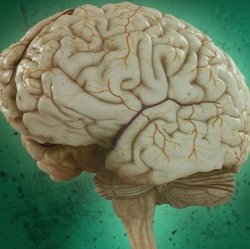
Lightly stimulating the brain with transcranial direct current stimulation (tDCS) may improve short-term memory in people with schizophrenia. The tDCS procedure involves placing sponge-covered electrodes on the head and passing a weak electrical current between them.
David Schretlen, Ph.D., a professor of psychiatry and behavioral sciences at the Johns Hopkins University School of Medicine, reasoned that this type of brain stimulation might ease some of the cognitive difficulties that afflict people with schizophrenia.
To test that possibility, Schretlen and Johns Hopkins colleagues targeted a brain region called the left dorsolateral prefrontal cortex, which plays an important role in short-term or working memory and is abnormal in people with schizophrenia, according to Schretlen.
Schretlen recruited 11 participants: five adults with confirmed schizophrenia and six of their close relatives (parents, siblings, and children of people with schizophrenia show some of the same abnormalities to a lesser degree, says Schretlen).
Each participant received two 30-minute treatments, one using a negative electrical charge, which the researchers thought might prove beneficial, and the other using a positive charge as a control. During and after each treatment, participants completed a battery of cognitive tests.
There were two notable results:
On tests of verbal and visual working memory, participants performed significantly better after receiving a negative charge, and the effects were “surprisingly strong,” says Schretlen.
Participants did better at the challenging task of switching between naming categories of items in a supermarket after a negatively charged treatment. The stimulation “was associated with better performance on working memory and subtle changes in word retrieval,” Schretlen says. People with schizophrenia often struggle to find the right words, he says. Because the prefrontal cortex contains a brain region responsible for word retrieval, Schretlen reasoned that transcranial direct current stimulation might help.
Schretlen is now studying transcranial direct current stimulation in a larger sample of patients using repeated sessions of stimulation, which he hopes will induce lasting benefits.
